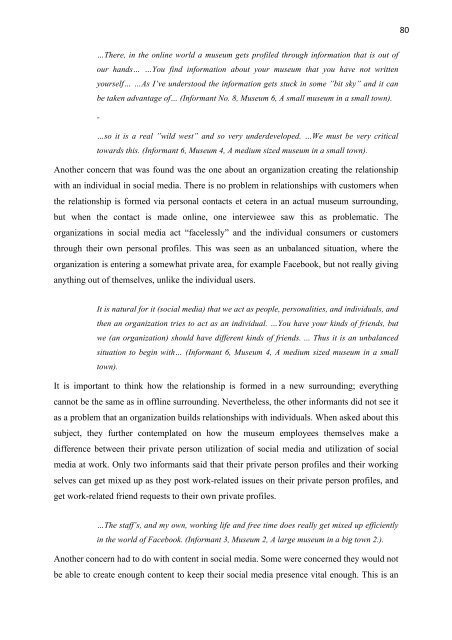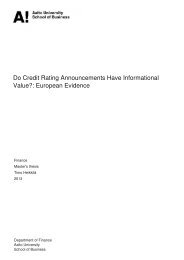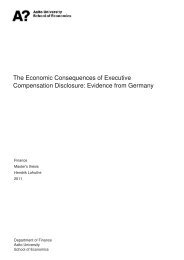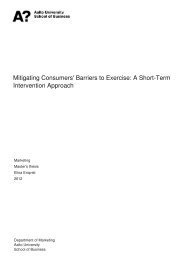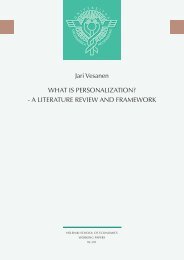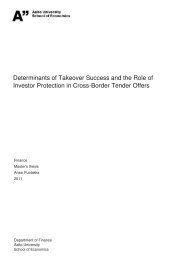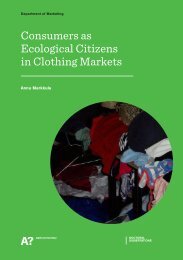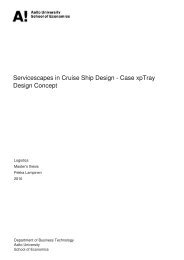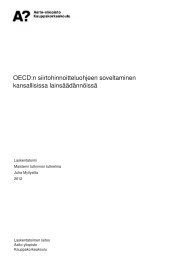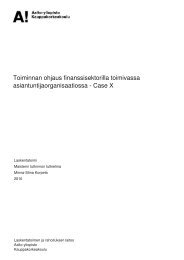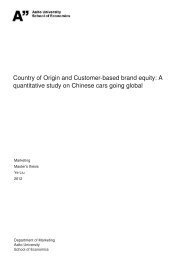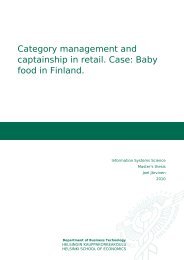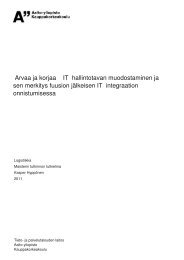Is there more to it than posting a status update?
Is there more to it than posting a status update?
Is there more to it than posting a status update?
Create successful ePaper yourself
Turn your PDF publications into a flip-book with our unique Google optimized e-Paper software.
…There, in the online world a museum gets profiled through information that is out of<br />
our hands… …You find information about your museum that you have not wr<strong>it</strong>ten<br />
yourself… …As I’ve unders<strong>to</strong>od the information gets stuck in some ”b<strong>it</strong> sky” and <strong>it</strong> can<br />
be taken advantage of… (Informant No. 8, Museum 6, A small museum in a small <strong>to</strong>wn).<br />
-<br />
…so <strong>it</strong> is a real ”wild west” and so very underdeveloped. …We must be very cr<strong>it</strong>ical<br />
<strong>to</strong>wards this. (Informant 6, Museum 4, A medium sized museum in a small <strong>to</strong>wn).<br />
Another concern that was found was the one about an organization creating the relationship<br />
w<strong>it</strong>h an individual in social media. There is no problem in relationships w<strong>it</strong>h cus<strong>to</strong>mers when<br />
the relationship is formed via personal contacts et cetera in an actual museum surrounding,<br />
but when the contact is made online, one interviewee saw this as problematic. The<br />
organizations in social media act “facelessly” and the individual consumers or cus<strong>to</strong>mers<br />
through their own personal profiles. This was seen as an unbalanced s<strong>it</strong>uation, where the<br />
organization is entering a somewhat private area, for example Facebook, but not really giving<br />
anything out of themselves, unlike the individual users.<br />
It is natural for <strong>it</strong> (social media) that we act as people, personal<strong>it</strong>ies, and individuals, and<br />
then an organization tries <strong>to</strong> act as an individual. …You have your kinds of friends, but<br />
we (an organization) should have different kinds of friends. ... Thus <strong>it</strong> is an unbalanced<br />
s<strong>it</strong>uation <strong>to</strong> begin w<strong>it</strong>h… (Informant 6, Museum 4, A medium sized museum in a small<br />
<strong>to</strong>wn).<br />
It is important <strong>to</strong> think how the relationship is formed in a new surrounding; everything<br />
cannot be the same as in offline surrounding. Nevertheless, the other informants did not see <strong>it</strong><br />
as a problem that an organization builds relationships w<strong>it</strong>h individuals. When asked about this<br />
subject, they further contemplated on how the museum employees themselves make a<br />
difference between their private person utilization of social media and utilization of social<br />
media at work. Only two informants said that their private person profiles and their working<br />
selves can get mixed up as they post work-related issues on their private person profiles, and<br />
get work-related friend requests <strong>to</strong> their own private profiles.<br />
…The staff’s, and my own, working life and free time does really get mixed up efficiently<br />
in the world of Facebook. (Informant 3, Museum 2, A large museum in a big <strong>to</strong>wn 2.).<br />
Another concern had <strong>to</strong> do w<strong>it</strong>h content in social media. Some were concerned they would not<br />
be able <strong>to</strong> create enough content <strong>to</strong> keep their social media presence v<strong>it</strong>al enough. This is an<br />
80


